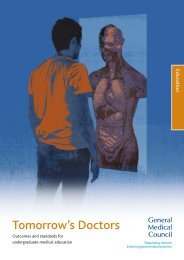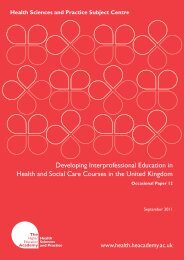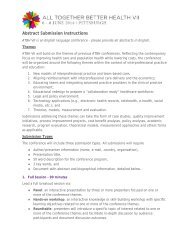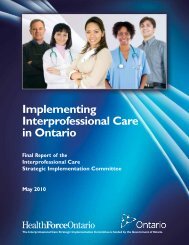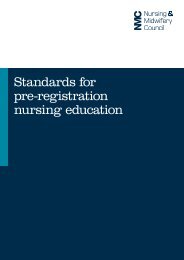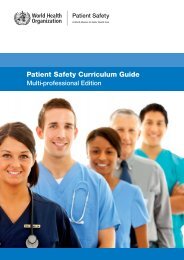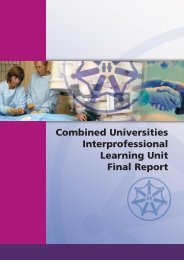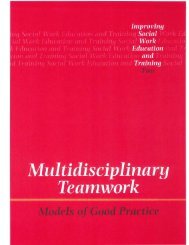Health and Social Care Policy and the Interprofessional ... - CAIPE
Health and Social Care Policy and the Interprofessional ... - CAIPE
Health and Social Care Policy and the Interprofessional ... - CAIPE
Create successful ePaper yourself
Turn your PDF publications into a flip-book with our unique Google optimized e-Paper software.
must be able to justify <strong>the</strong>ir actions <strong>and</strong> if <strong>the</strong>y are unable to do so<br />
satisfactorily, <strong>the</strong>ir registration with <strong>the</strong> GDC will be at risk (ibid: 5).<br />
The GDC, in <strong>the</strong>ir publication ‘Principles of dental team working’ state that<br />
‘good dental care is delivered by a dental team. The quality of teamwork is<br />
closely linked to <strong>the</strong> quality of care <strong>the</strong> team provides’ (GDC, 2006: 3). The<br />
GDC includes receptionists <strong>and</strong> practice managers as essential team<br />
members. Teamwork means working toge<strong>the</strong>r to provide good-quality dental<br />
care (ibid: Para 1.1). Para 1.3 makes reference to ‘<strong>the</strong> wider healthcare team’<br />
an acknowledgement of <strong>the</strong> fact that dental teams cannot work in isolation<br />
from o<strong>the</strong>r professions. In <strong>the</strong> GDCs opinion ‘a good team will have: good<br />
leadership; clear, shared aims, <strong>and</strong> work toge<strong>the</strong>r to achieve <strong>the</strong>m; <strong>and</strong><br />
different roles <strong>and</strong> responsibilities, <strong>and</strong> underst<strong>and</strong> those roles <strong>and</strong><br />
responsibilities’ (ibid: Para 5.1).<br />
The General <strong>Social</strong> <strong>Care</strong> Council (previously CCETSW)<br />
<strong>Social</strong> <strong>Care</strong>s commitment to interagency working has been evident for a<br />
number of years. Benchmark statements for <strong>Social</strong> Work acknowledge that<br />
‘contemporary social work commonly takes place in an inter-agency context,<br />
<strong>and</strong> social workers habitually work collaboratively with o<strong>the</strong>rs towards interdisciplinary<br />
<strong>and</strong> cross-professional objectives’ (QAA 2000: 11)<br />
In <strong>the</strong>ir Code of Practice social workers must be able to demonstrate that <strong>the</strong>y<br />
are ‘working <strong>and</strong> respecting <strong>the</strong> roles <strong>and</strong> expertise of workers from o<strong>the</strong>r<br />
agencies <strong>and</strong> working in partnership with <strong>the</strong>m’ (GSCC 2002: 6:7). However,<br />
in <strong>the</strong> National Occupational St<strong>and</strong>ards for social work <strong>the</strong> concept of<br />
partnership is embedded ra<strong>the</strong>r than used explicitly. Although one of <strong>the</strong> key<br />
roles relates to ‘plan, carry out, review <strong>and</strong> evaluate social work practice, with<br />
individuals, families, carers, groups, communities <strong>and</strong> o<strong>the</strong>r professionals’<br />
inter-agency working is not mentioned specifically (see TOPSS Engl<strong>and</strong>,<br />
2005).<br />
It appears that social services in each of <strong>the</strong> four home countries adopt a<br />
similar approach to partnership working with Engl<strong>and</strong> stating that ‘all social<br />
workers will learn <strong>and</strong> be assessed on partnership working’ (DH 2003b: 8). In<br />
Wales, based on <strong>the</strong> NOS <strong>and</strong> <strong>the</strong> QAA Benchmark Statement, ‘partnership’<br />
in terms of shared skills <strong>and</strong> knowledge is implicit throughout (NAW, 2003).<br />
Scotl<strong>and</strong> mentioned partnership specifically throughout <strong>the</strong>ir Framework in<br />
terms of underpinning knowledge, transferable skills <strong>and</strong> competence. They<br />
give as examples <strong>the</strong> need to work in partnership with service users, carers,<br />
partner organisations <strong>and</strong> colleagues in o<strong>the</strong>r organisations. The whole of<br />
St<strong>and</strong>ard 6 involves working in partnership to help individuals achieve <strong>and</strong><br />
maintain greater independence (Scottish Executive, 2003). In Nor<strong>the</strong>rn Irel<strong>and</strong><br />
partnership is mentioned both in relation to pre registration <strong>and</strong> post<br />
qualification. Knowledge of inter-professional working <strong>and</strong> <strong>the</strong> requirement to<br />
work in partnership with colleagues, provider organisations <strong>and</strong> with service<br />
users is evident throughout <strong>the</strong>ir Framework (DHSSPS <strong>and</strong> NISCC, 2003).<br />
48




